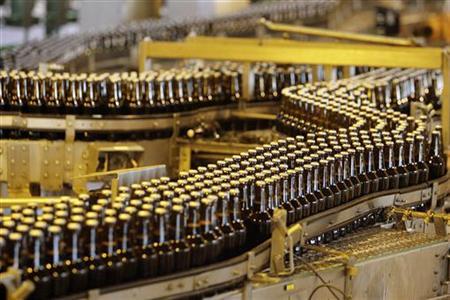
Africa has the world’s highest proportion of binge drinkers, even though its large populations of Muslims and evangelical Christians generally abstain from alcohol. As incomes rise, it has become a boom market for international brewers and distillers whose sales are often flagging in the wealthy world.
“It’s true that most people in Africa don’t drink for cultural, religious and economic reasons but those who drink, drink a lot,” said Dr Vladimir Poznyak of the World Health Organisation (WHO) in Geneva.
in Nigeria, Africa’s most populous nation and a huge beer market, alcohol regulation does exist but critics say it is loosely enforced.
Deputy director at the Nigeria Food and Drug Administration, said the country ensures consumers are aware of alcohol content through product labeling. It also regulates alcohol advertising.
“For TV commercials, as long as it will not lead people to abuse alcohol, we give approvals,”
It has been announced today that Diageo Plc will invest in expanding its Africa-based operations. The company, who owns popular alcohol brands such as Guinness and Smirnoff, wants to source 20 percent of its sales from the African continent, but has not indicated a time scale.
Although Guinness is traditionally associated with Ireland, around 40 percent of the total worldwide volume is brewed and distributed on the African continent; the third largest Guinness drinking nation, after Ireland and the UK, is Nigeria.
Currently, Africa accounts for roughly 13 percent of Diageo’s global sales, so their target to increase this by 7 percent is ambitious, but certainly achievable; the company has invested over 1$ billion (£647.6 billion) over the past five years to increase its presence on the continent.
The company began to expand its operations in Africa when it outbid several competitors in 2011 (including European brewer Heineken) for the purchase of Kenya’s last state-owned brewery, Meta Abo, paying a total of $225 million (£145.6 million.) Since then, Diageo has invested $119 million (£77 million) in the facility in what is surely a move to increase their influence in the region. As a result of its efforts, Diageo controls almost 100 percent of Kenya’s beer market, and has enjoyed very generous tax breaks from the government.
The company already has a high degree of visibility in the region, maintaining manufacturing operations in 16 African nations, with its wide range of beer, wine, and spirits brands being represented across a total of 40 countries across the continent.
Companies like Diageo have already committed serious funding to Africa and will surely unveil more plans in the near future; whilst this trend could bring many jobs, the social impact must be well monitored, since African countries do not have sophisticated health and social care networks.
@ The Afrika Market
FRENCH VERSION
« Il est vrai que la plupart des gens en Afrique ne buvez pas pourdes raisons culturelles, religieuses et économiques, mais ceux quiboivent, boire beaucoup, » a déclaré le Dr Vladimir Poznyak del’Organisation mondiale de la santé (OMS) à Genève.
au Nigeria, nation la plus populeuse de l’Afrique et un marchéénorme de la bière, boissons alcoolisées hasard existent mais lescritiques disent que c’est plus ou moins appliquée.
Directeur adjoint au Nigéria Food and Drug Administration, a déclaré le pays garantit aux consommateurs sont au courant dela teneur en alcool grâce à l’étiquetage des produits. Elleréglemente également la publicité de l’alcool.
« Pour les publicités télévisées, tant que cela ne conduira pasgens d’abuser de l’alcool, nous donnons approbations »
Il a été annoncé aujourd’hui que Diageo Plc va investir dansl’expansion de ses activités axées sur l’Afrique. La société, qui est propriétaire des marques d’alcool populaire tels que Guinness etSmirnoff, veut source 20 % de ses ventes sur le continent africain,mais n’a pas indiqué une échelle de temps.
Bien que la Guinness est traditionnellement associé à l’Irlande,environ 40 pour cent du volume total dans le monde entier estbrassée et distribué sur le continent africain ; la Guinnesstroisième plus grande nation, à boire après l’Irlande et duRoyaume-Uni, est le Nigeria.
Actuellement, l’Afrique intervient pour environ 13 pour cent desventes mondiales de Diageo, donc leur cible pour celaaugmenter de 7 % est ambitieux, mais certainement réalisable ; lasociété a investi plus de 1$ milliards (£ 647,6 milliards) au coursdes cinq dernières années pour accroître sa présence sur lecontinent.
La société a commencé à étendre ses opérations en Afriquequand il enchérir sur plusieurs concurrents en 2011 (y compriseuropéen brasseur Heineken) pour l’achat du Kenya dernièrepubliques brasserie, Meta Abo, verser un total de $ 225 millions(£ 145,6 millions.) Depuis lors, Diageo a investi $ 119 millions (£77 millions) dans les installations à ce qui est sûrement undéménagement pour augmenter leur influence dans la région.Grâce à ses efforts, Diageo contrôle presque 100 pour cent dumarché de la bière du Kenya et a apprécié fiscaux très généreusedu gouvernement.
L’entreprise possède déjà un haut degré de visibilité dans larégion, maintien des activités de fabrication dans 16 paysafricains, avec sa large gamme de bière, le vin et les marques despiritueux étant représentées à travers un total de 40 pays à travers le continent.
Des entreprises comme Diageo ont déjà engagé un financementsérieux à l’Afrique et dévoileront sûrement plus de plans dans unproche avenir ; alors que cette tendance pourrait apporterbeaucoup d’emplois, l’impact social doit être bien surveillée, carles pays africains n’ont pas sophistiqué de la santé et les réseauxde soins sociaux.


